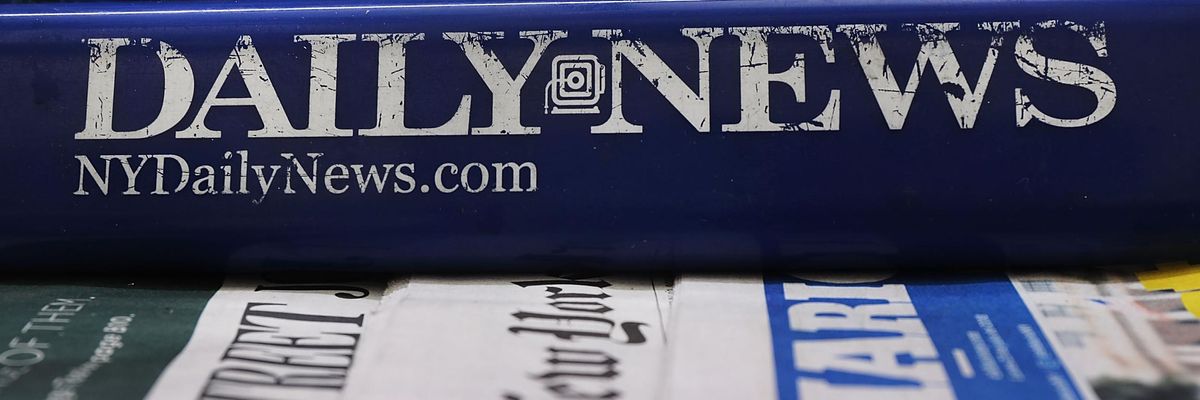If Hollywood wanted to make a gritty movie about the work of dig-it-out newspaper reporters who uncover big local stories of government doings and corporate misdeeds, it couldn't have chosen a more picture-perfect location than the boisterous newsroom of New York's Daily News. Once the largest-circulation paper in America, the Daily News embodied the rich history of brawny tabloid journalism, even serving as the model for DC Comics' Daily Planet, workplace of Clark Kent and Lois Lane in "Superman."
But there'd be a problem with filming at the Daily News now: Its owners have eliminated the newsroom, leaving reporters, editors, photographers, et al. with no shared workplace. Yes, today, it's a newspaper without a newsroom.
Alden is in the business of making money, not journalism.
This once-proud publication is now owned and run by Alden Global Capital, a multibillion-dollar hedge fund with a long record of buying papers on the cheap, selling off their assets and slashing pay and jobs. Media watchers have labeled these vulture capitalists the "ruthless corporate strip-miners" of local journalism. And sure enough, in the past couple of years Alden's profiteers have steadily plundered the paper, eliminating half of its newsroom staff. Then, last August, they told the remaining journalists they would no longer have a physical place to work.
To be clear, this closure was not a temporary measure to protect staff from COVID-19. Nor was the newsroom abandoned in favor of relocation to a less expensive office (an increasingly common cost-saving decision). Indeed, real newspaper publishers realize that the collective hive vitality of a newsroom, with its camaraderie and reportorial cross-fertilization, enriches the journalism.
But Alden is in the business of making money, not journalism. The Wall Street bosses emailed staff that they weren't selling the offices--just leasing them to other businesses, creating a new revenue stream to fatten the profits of the fund's investors.
Unfortunately, such crass corporate calculations are typical of the new model of a nationalized, "conglomeratized" and financialized "local" journalism that has already taken over thousands of papers in big cities, suburbs and rural areas across America.
The scale and speed of that transformation have been breathtaking.
Alden's high-flying hedge funders have amalgamated the second biggest newspaper conglomerate in the country, having swallowed up more than 200 papers, including metro dailies in Baltimore; Boston; Boulder, Colorado; Chicago; Denver; Hartford, Connecticut; Norfolk, Virginia; Orange County, California; Orlando, Florida; San Jose, California, and St. Paul, Minnesota.
Last August, in one blow, the 30 papers owned by the venerable McClatchy family fell to yet another multibillion-dollar hedge fund, Chatham Asset Management (led by a former Wall Street junk-bond dealer). With this buyout, Chatham's clique of global speculators grabbed the major dailies in Charlotte, North Carolina; Fort Worth, Texas; Kansas City, Missouri; Lexington, Kentucky; Miami; Sacramento, California, and Seattle.
Then there's the colossal Gannett conglomerate, now owned by Japan's SoftBank Group. It runs USA Today, as well as more than 1,000 local papers across the U.S., including the main dailies in Austin, Texas; Burlington, Vermont; Cincinnati; Detroit; Des Moines, Iowa; Indianapolis; Louisville, Kentucky; Milwaukee, Wisconsin; Nashville, Tennessee; Oklahoma City, Oklahoma; Phoenix; Providence, Rhode Island; Reno, Nevada, and Springfield, Missouri.
The operational mandate of newspaper hedge funds is absolute: Sacrifice local newsgathering and community interest to squeeze out every bit of profit and siphon it off to unknown investors in WhoKnowsWhereLand. The papers Alden acquired were reportedly profitable, with annual margins of around 10%. But the hedge fund sharpies demanded that all their papers deliver 20% or more--a level at which the squeeze becomes deadly to quality journalism.
Community life cannot thrive without community news, which in turn depends on reporters and editors who are of the community and have the know-how, time and resources to investigate, educate, expose, inform, entertain and generally enlighten the citizenry. But what does some obscure, aloof money manipulator know or care about your community or its democratic vitality? Zilch, that's what.

